Recent Articles
Popular Makes
Body Types
2017 Porsche Cayenne E-Hybrid Road Test and Review
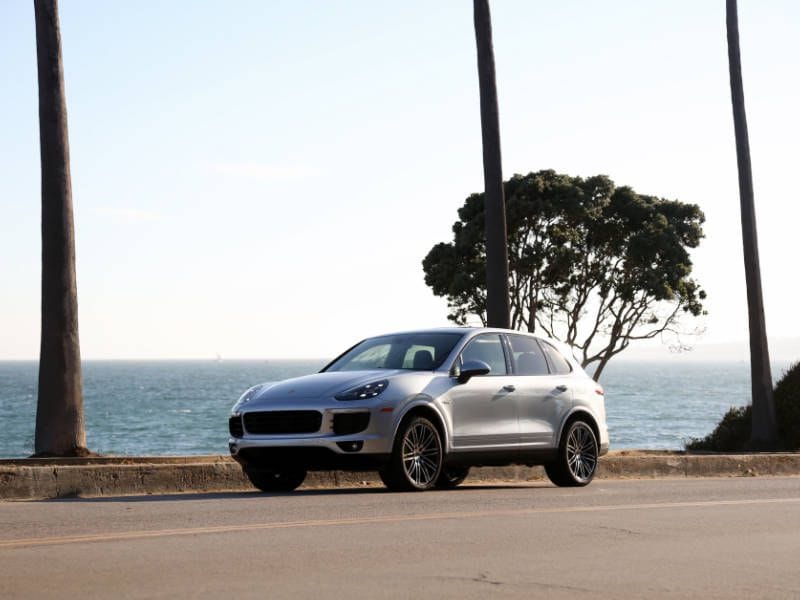
2017 Porsche Cayenne E Hybrid hero ・ Photo by Miles Branman
Over the past few years, three vehicle segments have grown faster than all others: alternative energy, premium, and SUV. In response, automakers are rushing to produce models within one or more of these categories to capitalize on consumer interest. Some luxury marques are starting from scratch, developing SUVs from scalable architectures with plug-in hybrid or pure electric components. Other brands, like Porsche, are reconfiguring successful crossovers to accommodate alternative energy powertrains.
Unsurprisingly, these “head-start” models are higher quality products with fewer developmental defects. It’s fun to be an early adopter, but ultimately more satisfying to know your vehicle is proven in all its forms. The Porsche Cayenne S E-Hybrid combines one of the best performance luxury SUVs with an efficient plug-in hybrid powertrain. Buyers needn’t change their lifestyles (as is required with all-electric vehicles) nor give up performance to get major fuel savings.
What’s New For 2017
The big news for 2017 is the introduction of a Platinum Edition for the Cayenne and Cayenne S E-Hybrid models. Highlights of the Platinum Edition include unique 20-inch wheels, Bi-Xenon headlights with Porsche Dynamic Light System, Power Steering Plus, front and rear ParkAssist, anti-glare side mirrors, rear privacy glass tinting, and high-gloss trim. The latest generation Porsche Communication Management infotainment system comes with navigation, a Bose surround sound audio system, and auxiliary cabin conditioning.
Apart from its new edition, the Cayenne S E-Hybrid design and powertrain carries over from the 2016 model year.
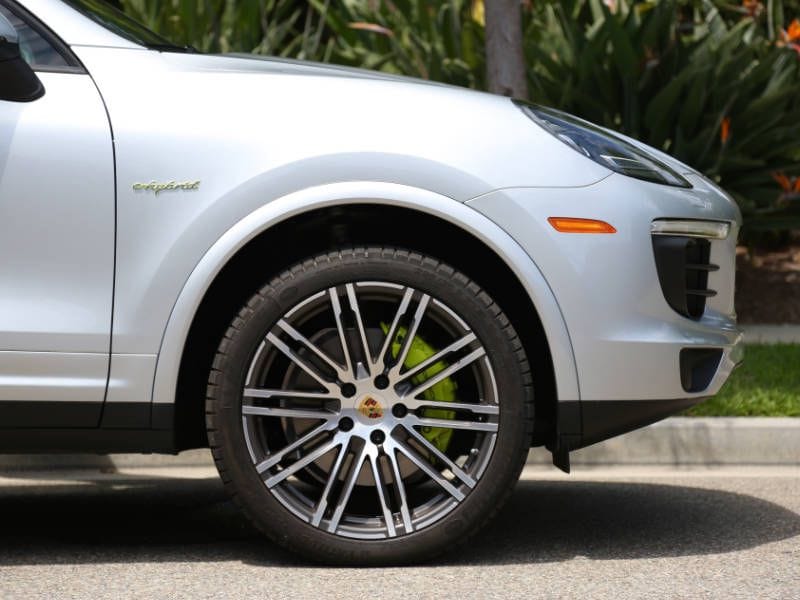
Photo by Miles Branman
Exterior Styling
The only visual cues to distinguish the plug-in hybrid Cayenne from standard models come in the form of Acid Green finishes on the badges and brake calipers. The effect remains subtle, as befits a premium SUV. The remainder of the Cayenne S E-Hybrid’s exterior is now familiar, having only been tweaked since the second-generation Cayenne debuted in 2011.
Porsche design lineage can be traced through the Cayenne’s cab-rearward silhouette, clean curves, and short overhangs. While many of the Cayenne’s midsize SUV competitors appear in need of a diet, Porsche’s entrant has a svelte, flowing exterior. Few brands produce clean vehicle aesthetics without being considered boring; Porsche consistently rises to the occasion. In particular, we are fond of Porsche’s Dynamic Light System, which emits brilliant light from four LED beams in each headlight housing. At night, the Cayenne is quite the spectacle, and during the day, the headlamps sit like jewels at each front corner.
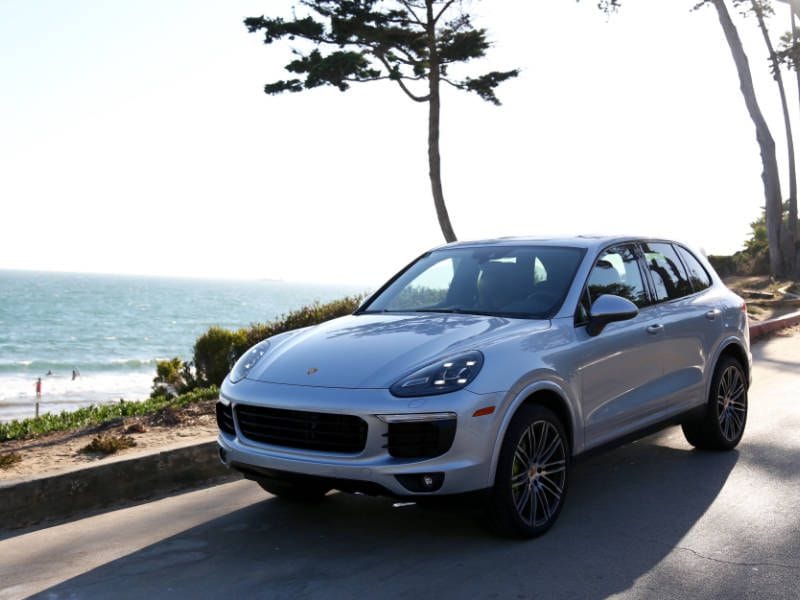
Photo by Miles Branman
Interior Comfort
Much as we dig the Cayenne’s exterior, its cabin is even more fetching. Lovers of symmetry will appreciate the cockpit’s equal proportions left-to-right. A brushed metal beam runs the lower end of the dashboard, intersecting four tall air vents and creating a sense of interior width. Higher on the dash sits an elegant analog clock, which mimics Porsche’s stopwatch in sports car models. Driver and front passenger each have a leather-wrapped grab handle protruding from the center stack, along with his or her own set of climate controls and seating heating/ventilation adjustments. Eight-way power leather/Alcantara seats come standard, and 18-way full-leather memory seats are available. Our test car's upgraded chairs proved ergonomic, supple and supportive even during a three-hour stint behind the wheel. While much of the cabin is constructed in equal measure, Porsches are still about the driver, which means he or she is treated to a gorgeous leather-wrapped sport steering wheel and pyramid gauge cluster. A 4.8-inch display nestles among analog readouts, showing navigation, telemetry, media or efficiency information based on driver preference. Passenger volume for up to five riders is superb. Cargo capacity, however, is stilted due to the placement of the battery system beneath the cargo floor. 20.0 cubic feet is enough for most errands, but owners will need to fold the 40/20/40 rear bench to accommodate larger items.
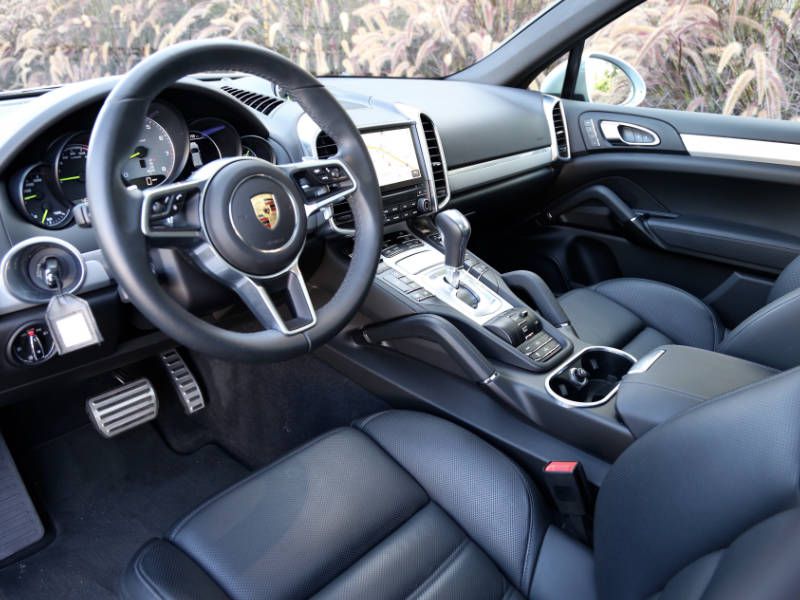
Photo by Miles Branman
Powertrain and Fuel Economy
The 2017 Porsche Cayenne S E-Hybrid pairs a 3.0-liter supercharged six-cylinder engine rated at 333 horsepower with an electric motor for a combined 416 hp and 435 lb-ft of torque. Hooked up to the electric powertrain is a 10.8-kWh lithium-ion battery pack that affords 14 miles of all-electric commuting. Shuttling power to all four wheels is an eight-speed automatic gearbox. Porsche’s most efficient Cayenne rockets to 60 mph in just 5.2 seconds and doesn’t slow until it reaches an electronically limited top speed of 151 mph. Given the SUV’s weight of 5,373 pounds, these figures are astounding. In hybrid mode (the default setting with a depleted battery) the Cayenne still outpaces most vehicles, though it's significantly slower on electric power alone. While operating as a conventional gas-electric hybrid, the Cayenne S E-Hybrid is rated at 22 combined mpg. Factoring in its plug-in electric charge, the SUV improves to an EPA-rated 46 mpg-equivalent. Those with short daily commutes or with office-based charging systems will get the most out of the plug-in hybrid Cayenne. However, long daily hauls without replenishing the battery will cut deeply into the E-Hybrid’s efficiency.
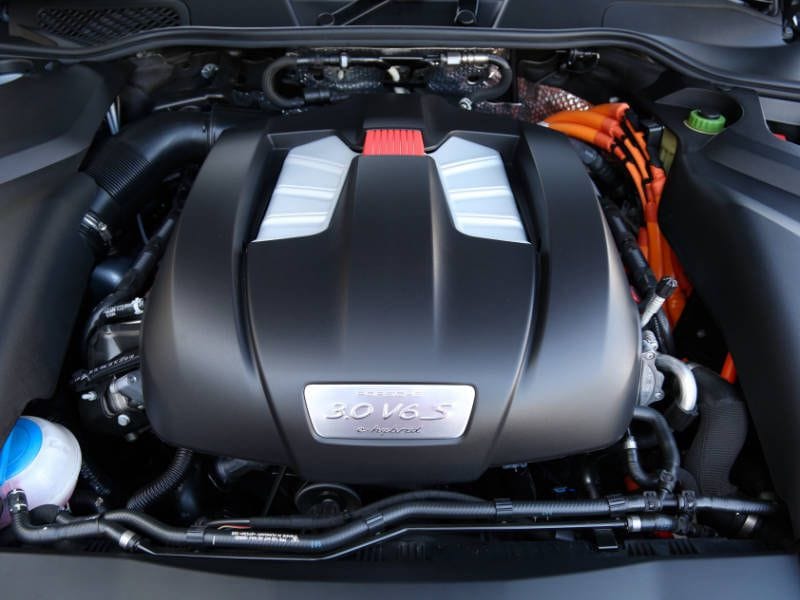
Photo by Miles Branman
Driving Dynamics
When Porsche first introduced the Cayenne in 2002, enthusiasts expected an SUV to taint the brand. But the soul of performance clung so dearly to the new product that dread soon turned to praise. Thankfully, the only thing that’s changed since then is that the Cayenne is more capable than ever. Chief among the Cayenne hybrid’s dynamic strengths is its electrically assisted steering. Porsche offers the best of such systems, dialing in both responsiveness and feedback perfectly. Our tester also features Porsche’s optional air suspension, which can soften the ride considerably in Comfort mode and tighten the handling in Sport and Sport Plus modes. Those who aren’t familiar with hybrid vehicle behavior might need to adjust to the feel of regenerative brakes, but stopping power is authoritative. Despite its size and weight, the Cayenne S E-Hybrid feels nimble and confident, fully representing Porsche’s sports car DNA.
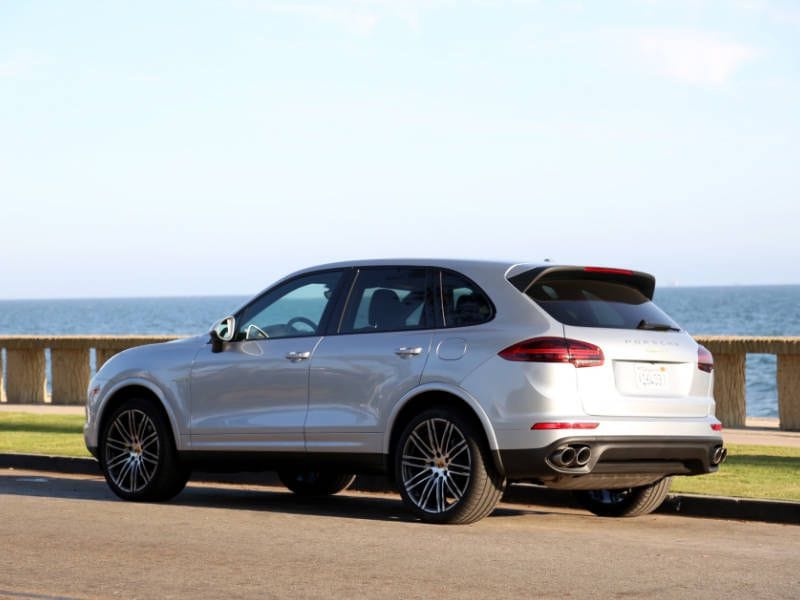
Photo by Miles Branman
Convenience and Safety Features
The Cayenne S E-Hybrid Platinum Edition is equipped with a long list of standard convenience features, including dual-zone climate control, remote climate conditioning (which lets the driver cool the car remotely), rain-sensing wipers, auto-dimming mirrors, a 14-speaker Bose sound system and a power tailgate. Standard safety features include driver and passenger front and knee airbags, front and rear side airbags, curtain airbags, stability control, antilock brakes, and front and rear parking sensors. Optional driver aids include a lane-departure warning, lane change assist, adaptive cruise control, a backup or 360-degree camera, and front-collision warning with automatic braking. Neither the NHTSA nor the IIHS has crash-tested the Cayenne.
The car's many functions are operated through a logical, robust assortment of buttons or through the touchscreen infotainment system. While not the largest or most vivid display, this system is both intuitive and responsive. Paired with steering wheel-mounted buttons and voice controls, the Cayenne has functional redundancies to accommodate any driver preference.
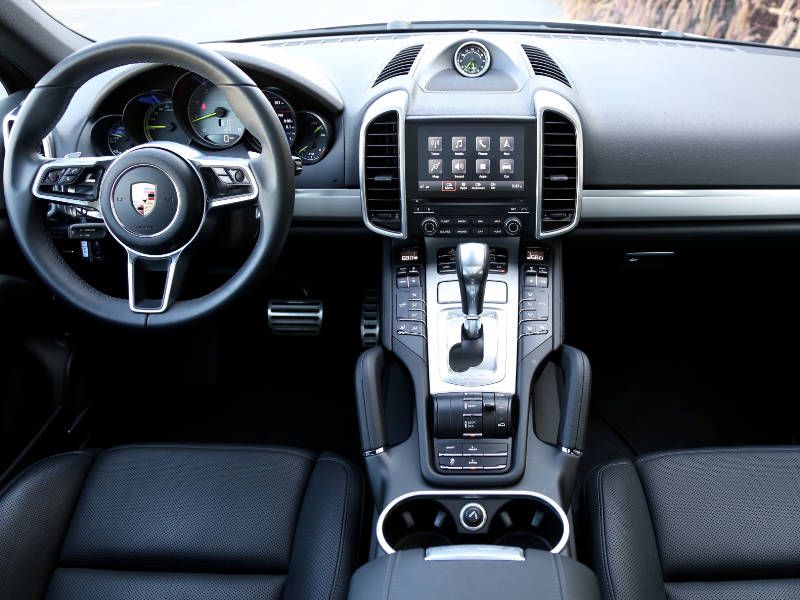
Photo by Miles Branman
Pricing and Packages
The 2017 Porsche Cayenne S E-Hybrid is priced from $78,700; the new Platinum Edition models sticker for $81,600. Both of these figures exclude a $1,050 destination charge. Porsche offers a few packages for its Cayenne models. The Premium Package ($2,740) includes a backup camera, adaptive sport seats, panoramic sunroof, front ventilated seats and comfort lighting. The Premium Plus Package ($6,160) adds keyless entry and starting, rear heated seats, rear power sunblinds and lane change assist. The Sport Package ($2,600) includes the adjustable air suspension, Sport Chrono and Sport tailpipes. Popular standalone features include the air suspension ($1,990), LED headlights and dynamic beams ($2,070), an optional 7.2-kWh onboard charger ($840) and metallic paint like this tested Rhodium Silver vehicle ($790).
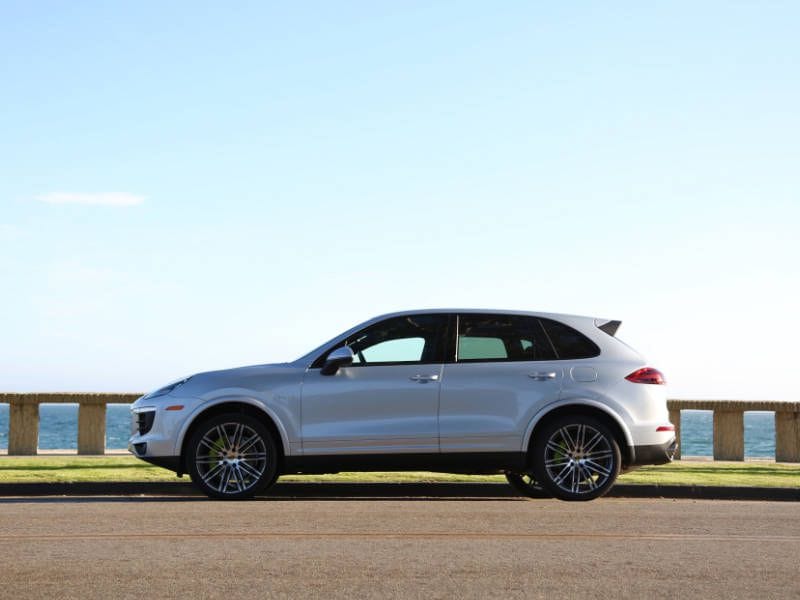
Photo by Miles Branman
Highs and Lows
Highs: - Class-leading acceleration - Stability under braking and when cornering - Communicative electric steering system - Ergonomic, plush sport seats - Impressive real-world efficiency Lows: - Limited cargo capacity for an SUV
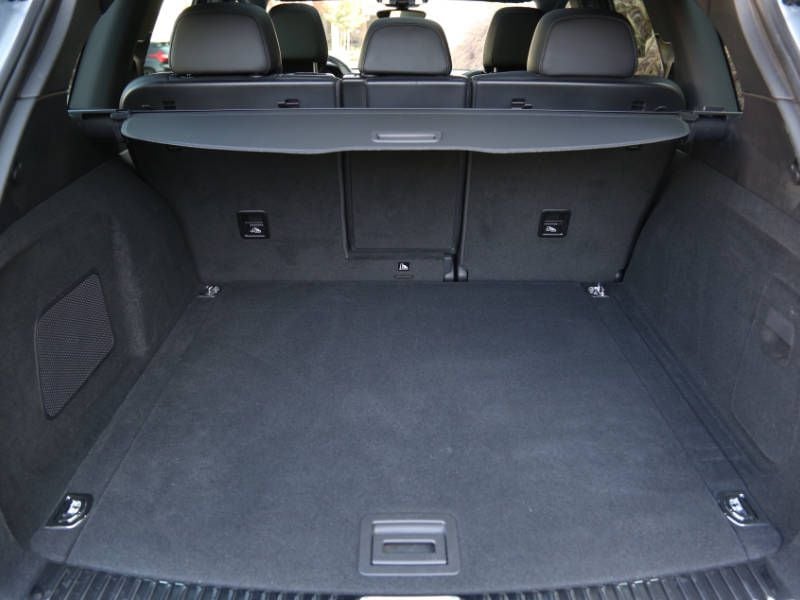
Photo by Miles Branman
Competition
Though the Porsche Cayenne S E-Hybrid seems like a niche offering, it has two direct rivals: BMW’s X5 xDrive40e and Mercedes-Benz’s GLE550e. To a lesser extent, the Lexus RX 450h is in the mix, though it is only a conventional hybrid that can't be plugged in for all-electric range. Meanwhile, the Tesla Model X is an electric-only vehicle that can't operate without being recharged. Porsche’s plug-in slots between the BMW and the Mercedes-Benz in terms of mpg-equivalent, edging out the Merc’s 43 MPGe but falling short of the BMW’s 56 MPGe. The Cayenne hybrid ties the X5 for all-electric range (14 miles) and trumps the GLE’s 12 miles. Power might favor the Mercedes-Benz (436 horses), but the Porsche is faster to 60 mph than both its rivals. The final measure is price, which favors either the $63,095 BMW or the $66,300 Mercedes-Benz. However, when optioned with similar equipment, the price gap narrows considerably.
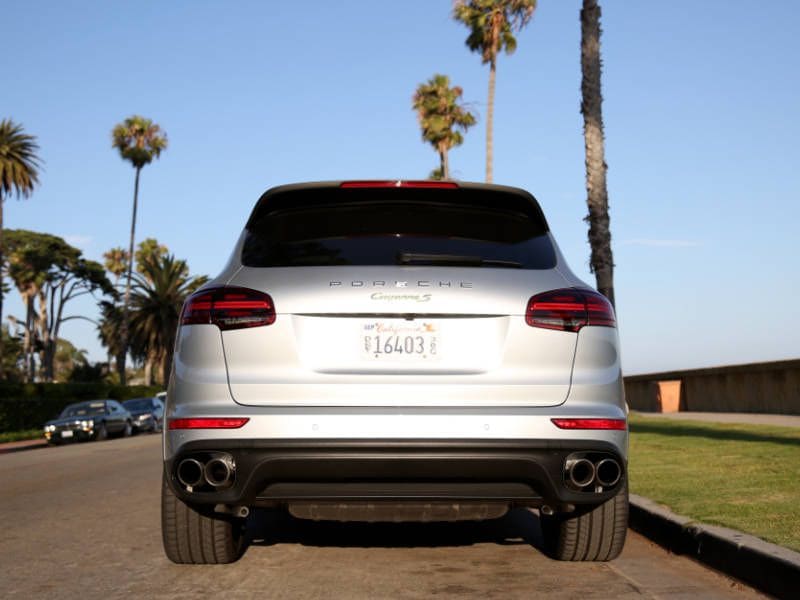
Photo by Miles Branman
Final Thoughts
At a mere $2,500 more than the standard Porsche Cayenne S, the E-Hybrid is a tremendous offering. Building upon the top midsize premium SUV in the segment is a smooth hybrid powertrain, usable all-electric range, and comprehensive feature set. Until the market shifts resolutely to pure electric vehicles (with extensive ranges), the Cayenne plug-in stands as the best of an eco breed.
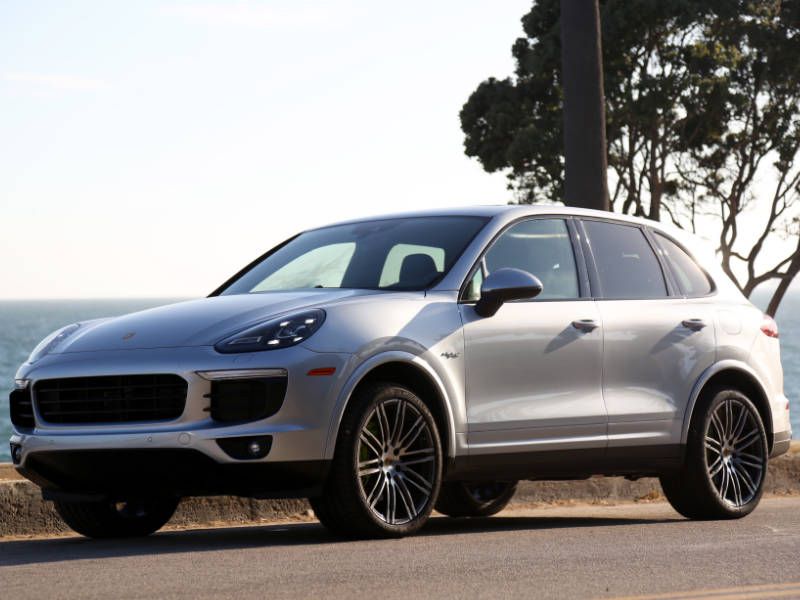
Photo by Miles Branman